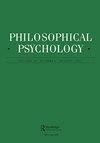为什么人们在 VR 中似乎比在问卷调查中更加功利?
IF 2.1
3区 哲学
Q2 ETHICS
引用次数: 0
摘要
几项关于道德判断和道德决策的实验研究表明,在虚拟现实中,人们往往会做出比在现实中更多的 "典型功利性 "决策。本文章由计算机程序翻译,如有差异,请以英文原文为准。
Why do people seem to be more utilitarian in VR than in questionnaires?
Several experimental studies on moral judgment and moral decision-making show that in virtual reality people tend to make more “characteristically utilitarian” decisions than when responding to sta...
求助全文
通过发布文献求助,成功后即可免费获取论文全文。
去求助
来源期刊

Philosophical Psychology
Multiple-
CiteScore
2.40
自引率
14.30%
发文量
120
期刊介绍:
Philosophical Psychology is an international journal devoted to developing and strengthening the links between philosophy and the psychological sciences, both as basic sciences and as employed in applied settings, by publishing original, peer-refereed contributions to this expanding field of study and research. Published articles deal with issues that arise in the cognitive and brain sciences, and in areas of applied psychology.
 求助内容:
求助内容: 应助结果提醒方式:
应助结果提醒方式:


